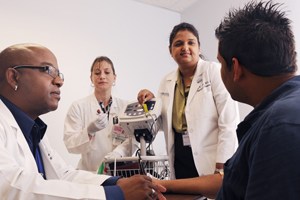UT Southwestern recruiting participants for HIV vaccine study
DALLAS - Sept. 10, 2010 - UT Southwestern Medical Center researchers
are recruiting individuals at high risk of contracting HIV for a nationwide clinical trial to investigate whether the combination of two potential vaccines will stimulate an immune response to the virus that causes AIDS.
The study is funded by the HIV Vaccine Trials Network (HVTN) and the National Institute of Allergy and Infectious Diseases.
"We hope that this trial will help us better understand how the immune system may work to prevent HIV/AIDS," said Dr. Mamta Jain , assistant
professor of internal medicine at UT Southwestern and principal investigator of the local effort. "It is with this better understanding of the immune system that we may ultimately find a vaccine that may prevent
HIV infection." 
This has led researchers to believe HIV-infected cells may lay-in-wait somewhere in the body. Important new research
by U-M has discovered that bone marrow, previously thought to be resistant to the virus, can contain latent forms of the infection.
Dr. Jain stressed that participants cannot contract HIV from the vaccine.
"This trial may help us better understand why some people develop AIDS and others don't. If you could prevent people from getting sick from AIDS, that's a tremendous accomplishment."
Both components of the combined vaccine, which is designed to produce immune cells called T cells and antibody responses against HIV, have been found safe when tested in animals and hundreds of humans in previous clinical trials.
"The vaccine is composed of man-made proteins that are found in HIV, not the HIV virus itself," Dr. Jain said. "The vaccine cannot cause infection."
HIV is transmitted predominantly by unprotected sexual contact with an infected partner. Although huge leaps in scientific knowledge over the past three decades have led to a much better understanding of the complex disease, preventing its spread has proved much more challenging. Today, someone in the U.S. becomes infected with HIV every 10 minutes.
The study, known as the HVTN 505 study, is designed to determine whether this new combo-vaccine will reduce the HIV viral load of people who subsequently become infected with HIV, preventing the onset of AIDS.
For the clinical trial, 1,350 volunteers nationwide will be assigned randomly to receive either the combination vaccine or a placebo. Forty to 50 people will participate at UT Southwestern; the next closest site is 650 miles from Dallas at the Alabama Vaccine Research Clinic in Birmingham.
"This is the only HIV vaccine trial in the country enrolling participants, so we are very excited to be part of this endeavor," Dr. Jain said.
Participants in the three-year study will receive three shots of the research vaccine or a placebo, plus a booster shot, within the first six months. They will then return every three months for an HIV test, interview and risk-reduction counseling.
Investigators are seeking to enroll healthy, non-HIV-infected men ages 18 to 45 who have sex with men, and transgender women who have sex with men.
For more information about the clinical trial, call
214-590-0610 or 214-590-0603,
or visit www.hopetakesaction.org .
Visit https://utswmed.org/conditions-treatments/infectious-diseases/ to learn more about UT Southwestern's clinical services for infectious diseases
###
SOURCE: UT Southwestern Medical Center
Media Contact:
Kristen Holland Shear
214-648-3404
kristen.hollandshear@utsouthwestern.edu
|